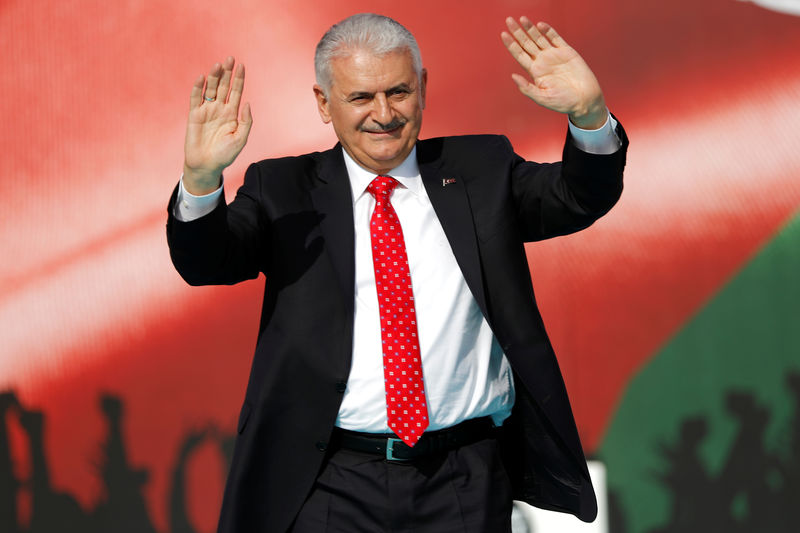 © Reuters. Turkish PM Yildirim greets the crowd as he takes part in a protest against the recent killings of Palestinian protesters on the Gaza-Israel border and the U.S. embassy move to Jerusalem, in Istanbul
© Reuters. Turkish PM Yildirim greets the crowd as he takes part in a protest against the recent killings of Palestinian protesters on the Gaza-Israel border and the U.S. embassy move to Jerusalem, in IstanbulBy Orhan Coskun
ANKARA (Reuters) – It took days of preparation by Turkey’s top economic ministers and intervention by the prime minister to convince President Tayyip Erdogan of the need for a sharp increase in interest rates, three people familiar with the matter said.
As a selloff in the lira spiraled toward a full-blown crisis on Wednesday, the central bank announced an emergency increase of its top rate by a 3 percentage points, to 16.5 percent, a move designed to put a floor under Turkey’s currency.
The decision was the outcome of rounds of talks that started in earnest three days earlier, when Deputy Prime Minister Mehmet Simsek and Finance Minister Naci Agbal convened an emergency meeting with Central Bank Governor Murat Cetinkaya to address the crisis, the sources said, declining to be identified because of the sensitivity of the information.
That the central bank was unable to move immediately, and that its move ultimately required the intervention of Prime Minister Binali Yildirim two days later, points to tension over monetary policy at the top of Turkey’s government.
A self-described “enemy of interest rates” Erdogan has, with elections just a month away, repeatedly called for lower borrowing costs to fuel credit growth and spending. International investors want to see higher rates to rein in double-digit inflation and have dumped the lira on concerns about Erdogan’s influence over monetary policy.
“Was it a late decision? Yes. The currency would not have to trade at these levels if this hike was carried out earlier,” said one senior official from Erdogan’s ruling AK Party.
The ministers believed that it was not just the currency at stake – even though the lira had fallen by about a fifth this year – but the need to prevent “permanent damage” to the economy, one of the sources said.
They agreed on the need for rate increase to calm the lira, and then conveyed that message to Yildirim, at a separate meeting later on Monday, the sources said.
Representatives for Agbal and Simsek could not immediately be reached for comment. No one was immediately available to comment at the central bank, the prime minister’s office or the presidency.
‘NOT SO KEEN’
More talks followed on Tuesday, where additional potential steps to arrest the lira decline was discussed.
Yildirim ultimately broached the topic of a rate hike with Erdogan on Wednesday at their weekly meeting – a full two days after hearing from the ministers about the need for the increase. By then the lira was falling fast, tumbling more than 5 percent at one point.
“The need for a rate hike was clearly conveyed,” said one of the sources. “Other bureaucrats also took part in the meeting. We know Erdogan was not so keen on this idea.”
A former transport minister and an Erdogan loyalist, Yildirim’s ties to the president date back to the 1990s, when he ran a ferry company in Istanbul, where Erdogan was mayor.
He will no longer be prime minister after June, as that position will disappear under a new executive presidency. Instead, he is running for parliament.
Much of the lira’s selloff was sparked by Erdogan’s own comments last week that he expected to assert more monetary policy control after the June 24 parliamentary and presidential elections.
The most popular, but also divisive, politician in modern Turkish history, Erdogan has overseen strong economic growth in his 15 years in power but, more recently, also a deepening social crackdown.
The rate hike, announced late on Wednesday, was something of a victory for Simsek, a former Wall Street banker seen as one of the most investor-friendly faces in the cabinet.
Simsek said on Twitter that it was “high time” that Turkey restored monetary policy credibility, comments that initially helped the lira strengthen.
“His tweets were the clearest messages recently. Simsek’s statement also boosted the impact of the central bank’s decisions,” said the AKP official.
The boost from the central bank move has proved short-lived, with the lira giving up a big slice of the gains on Thursday, as investors bet that more rate hikes will be needed.
Since then, the lira has continued to weaken as investors bet that the 3 percentage point increase will not be enough to tame inflation, and that the central bank will hike again at its next scheduled policy meeting on June 7.
“There can be another attack on the lira before (then)…,” said the AKP official. “We must be ready for this.”
Source: Investing.com




























